Opinion
Politics as usual no remedy for Islamic extremism
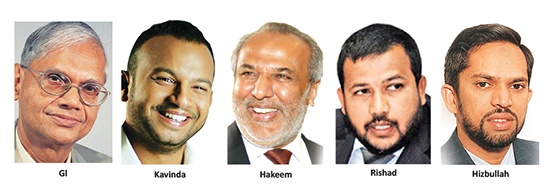
By Rohana R. Wasala
A heated exchange took place in Parliament a couple of days ago (November 26 or 27) about the so-called Batticaloa Sharia University, between Opposition MP Kavinda Jayawardane of the Samagi Jana Balavegaya (SJB) and Minister of Education Prof. G.L. Peiris MP (SLPP), as reported on Hiru TV. Following is a rough and ready verbatim translation of the dialogue with essential clarifications in parentheses (It is subject to the usual limitations of a translation, though):
KJ:-
The Easter (Sunday) attacks killed more than 350 of our Catholic people and left more than
500 physically disabled to this day. Terrorist Saharan carried out those attacks.
Former (Eastern Provincial) Governor Hizbullah had direct relations with this terrorist. Even the Chairman of the Presidential Commission of Inquiry (on the Easter attacks) said, in relation to this governor, that the legal process initiated concerning this university was unlawful. You, as the then Opposition, said before the presidential election, that this Sharia University will be taken over by the government.
GL:-
There’s no final decision on that (subject). We will not let it exist as a private institution. I say this to the Hon. Member very emphatically.
KJ:-
This university’s curriculum includes Sharia Law as a course component. Unless it is brought under government control, this country’s innocent children will be taught the Sharia with extremist ideologies.
GL:-
Before 2015, Hon. Member, there was a clear strategy to handle the problem. We did not allow the Sharia law to sow dissension, hatred on the pretext of teaching various courses. After 2015, they (the Yahapalana administration) even let foreign lecturers come into the country without checking on their past; they were given ‘visa on arrival’ (facility) at the airport. We didn’t do so in our time. The Yahapalana government gave carte blanche to anyone (any Tom, Dick or Harry) to come and teach any course, at any place, at any time. We are reaping what you sowed.
KJ:-
Please tell the House whether this government is going to allow the teaching of the Sharia Law in this country or not?
GL:-
Sharia or anything else, we’ll see whether it is in conformity with the Constitution.
We will find out who created this. It is a problem that you passed on to us.
KJ:-
Don’t try to pass the buck. You are in power now. During the presidential election, you said
clearly that you will not allow extremism to raise its head; that you will not allow Sharia to
be taught; that those who caused abortions will be taken to court; that Dr Shihabdeen will
be hanged. But now you’ve forgotten about Shafi Shihabdeen; you’ve forgotten about
Sharia; you’ve forgotten about the Batticaloa Campus. In regard to the Easter Sunday
attacks, officials are being hunted; but the persons who taught the bombers the terrorist
ideology and induced the terrorist mindset (that drove them) are left alone.
GL:-
All these things were done to obtain the support of certain extremist groups for achieving narrow ends. That is the truth. It is now that the evil consequences (of those actions) are becoming obvious.
(End of the translation)
First of all, I beg that Professor Peiris and Dr Jayawardane please bear with me for taking the liberty of subjecting your Parliamentary conversation to a kind of dispassionate critical analysis, that, I hope, will contribute what little it may to the emerging trend of constructive, though usually hostile, criticism in the social media directed at the speeches and actions of our MPs both inside and outside the House. Personally, I have great respect for both: the senior one is reaching the summit of an illustrious career as a celebrated legal studies academic and as an experienced parliamentarian; the junior one, professionally a medical practitioner like his late father the then UNP’s nationalist-leaning Dr Jayalath Jayawardane, is just starting what is invariably going to be a distinguished political career, given the potential he has already shown. No personal disrespect, humiliation, or offence towards either is intended by the following opinion, offered for what it is worth.
MP Jayawardane may be exaggerating things on the spur of the moment when he says that more than 350 Catholics were killed in the EasterSunday bombings (Of course, there’s no gainsaying the fact even one killed is too many) and when he talks about somebody’s alleged past threat to hang someone. Be that as it may, as a concerned Sri Lankan, I found the exchange between the two Honourable Members in the august Assembly very depressing in these critical times. My impression was that both speakers were ignorant of, or indifferent to, the crucial matter they were, somewhat implicitly, arguing about: how to deal with the emerging Islamist threat to Sri Lanka, which is behind the simmering controversies, including the Batticaloa Sharia University issue, Hizbulah’s connection with it, and complaints that Dr Shafi Shihabdeen had performed non-consensual tubal sterilisations on Sinhalese mothers during a flaunted record number of caesarean section operations.
To MP Jayawardane’s question whether the government was going to bring the Batticaloa Sharia University under government control, Minister Peiris assured him that though no decision had been arrived at regarding that, it will not be allowed to exist as a private institution. This could mean that the college will not be allowed to continue at all (which is unlikely) or it will be assigned to the state university system. However, this is part of the unimaginably thorny issue of what to do about the madrasas that have mushroomed around the country. Neither speaker seems to have the faintest idea about the bigger picture. Obviously, Peiris is bluffing and Jayawardane is trying to call his bluff, though both of them are equally ignorant of the real problem.
Jayawardane is asking whether the government is going to allow the teaching of the Sharia Law. Actually, it is a non-question. There is no question of allowing or not allowing the teaching of Sharia for it is an essential part of Islam. The Arabic word sharia means the ‘way’. Google says Sharia ‘is more accurately understood as referring to wide-ranging moral and broad ethical principles drawn from the Quran and the practices and sayings (hadith) of Prophet Muhammad’. In my opinion, it parallels the Noble Eightfold Path in Buddhism. Of course, the two things are like chalk and cheese or apples and oranges. The issue is whether certain aspects of Sharia law (such as death for blasphemy, apostacy, and amputation for stealing) can be implemented in a democratically governed non-Muslim majority country like Sri Lanka.
Minister Peiris maintains that, before 2015, extremist Islamic was kept under control, and that the present troubles are the result of the wrong attitude of the Yahapalanaya to the problem. I’m afraid this is not totally true. Rishard, Hakeem, Hizbullah, Salley, etc., pursued their careers in those halcyon days, as ‘powerful allies’ of president Mahinda Rajapaksa while underground Islamic extremist activities were going on, despite the vocal agitations of the monks, which fell on deaf ears. The above-named Muslim politicians cannot be described as terrorists or terrorist backers; but it is quite possible, going by what is being revealed during investigations, that they were abused as a protective phalanx by the Jihadists including suicide bomber Zahran Hashim unbeknown to those popular personages. Unfortunately, it looks like the same thing is happening today, despite the availability of young Muslim leaders, both in parliament and outside, who think out of the box as president Gotabaya Rajapaksa correctly insists on doing. MP Jayawardane, probably unknowingly, forced Minister Peiris to admit what is most likely to be the truth, which applies to politicians of both the main parties/their new manifestations: ‘All these things were done to obtain the support of certain extremist groups for achieving narrow ends. That is the truth. It is now that the evil consequences (of those actions) are becoming obvious.’
Trying to please veiled opportunists is no way to tackle the Islamist problem because they, like the few mentally unhinged terrorists, are actually in a really insignificant minority. Such a policy can easily demoralize the educated young Muslim leaders who are braving the few lawless terrorists who may be ruling the roost within the community evading detection under the radar of the security agencies. Jihadist extremists use fear as a weapon. Despite this, increasing numbers of young Muslim women are now publicly speaking up against unwarranted impositions on them regarding their dress, choice of marriage partners, socialization with members of the opposite sex, and so on in the name of religion as decided by a few conservative Muslim males. It is a fact that growing numbers of young Muslims and Tamils of both sexes are establishing close political links with their Sinhalese counterparts.
Incidentally, the spat between state minister of wildlife protection Wimalaweera Dissanayake, SLFP MP, and some officials of the wildlife department, no doubt, brought an unpleasant sense of deja vu to most of us who were familiar with the escapades of a now discredited and defeated former MP from Kelaniya. Whatever the truth at the centre of the episode, Dissanayake clearly failed to behave as he should have. There appears to be some nefarious activity indulged in by some crooks in that locality who may have won the misplaced confidence of the deputy minister. This impression was reinforced by some well-known young activist monks who symbolically pulled down an unauthorised shed built to shelter cows in the forest reserve; the monks complained that criminal elements were continuing their activities in that place rich with ancient archaeological remains in spite of the relevant authorities having been warned about the matter before. Adding insult to injury, MP Roshan Ranasinghe of the SLFP has also castigated the wildlife officers. This cannot be approved of either. There may be a few of them who are guilty of various offences, but indiscriminately condemning government functionaries is a bad thing. We know how dedicatedly our doctors, nurses, police and army officers execute their duties in trying to control the Covid-19 pandemic situation; they are doing that in the name of the country, most of them inspired by the example of the new president, expecting no public plaudits unlike most politicians. Had Gotabaya not been there, some of these politicians would not have been elected to parliament. They are obstructing the president’s action plan. It is clearly a crime for a politician to demoralize even a single dutiful public servant.
The Parliament or the House of Representatives is traditionally described as ‘august’ and the elected members who meet there to legislate as honourable. These are formal words that are ceremonially used, but they are not devoid of serious meaning. The augustness of the Parliament as the supreme legislature of the country and the honourableness of the Members of Parliament as the elected legislators are inviolable, though the persons who man the institution from time to time may or may not be really worthy of those epithet Honourable. ‘August’ in this context means dignified, distinguished, imposing, stately, solemn, etc; the opposite qualities include frivolous, silly, undignified, and so on. ‘Honourable’ has the sense of bringing or deserving respect, honest, moral, ethical, principled, righteous, etc. Antonyms of the word are dishonourable, despicable, crooked, deplorable, and similar negatives. Having said this, I would like to finally add that it is a reason for consolation for us that our MPs do preserve their personal dignity and the solemness of the institution that they man up, with a few exceptions, that too, under pressure of circumstances. Occasional unparliamentary behaviour among members is what prevails in most democracies around the world, and it is due to fallible human nature.
- News Advertiesment
See Kapruka’s top selling online shopping categories such as Toys, Grocery, Flowers, Birthday Cakes, Fruits, Chocolates, Clothing and Electronics. Also see Kapruka’s unique online services such as Money Remittence,News, Courier/Delivery, Food Delivery and over 700 top brands. Also get products from Amazon & Ebay via Kapruka Gloabal Shop into Sri Lanka.
Opinion
Take Human Rights seriously, not so much the council or office
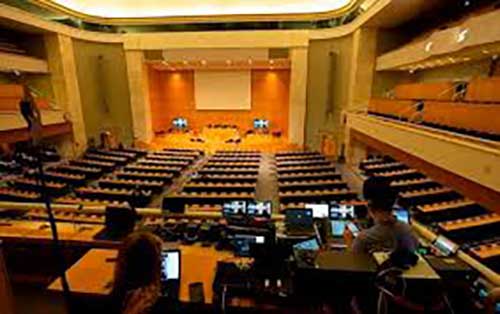
By Dr Laksiri Fernando
The 46th Session of the UN Human Rights Council started on 22 February morning with obvious hiccups. The Office, to mean the Office of the UN High Commissioner for Human Rights, finally decided to hold all sessions virtually online, only the President of the Council and the assistants in the high table sitting at the UN Assembly Hall in Geneva. The President, Ms. Nazhat Shammen Khan, Ambassador from Fiji in Geneva, wearing a saree, was graceful in the chair with empty seats surrounding.
In the opening session, the UN General Assembly President, UN General Secretary, UN High Commissioner for Human Rights, and Head of Foreign Affairs, Switzerland (as the host country), addressed remotely the session. In fact, there was no need for Switzerland to have a special place, as the UN is independent from any host country. Switzerland is fairly ok, however, if this tradition is followed, the UN General Assembly may have to give a special place to the US in New York.
Initial Addresses
UN General Secretary, Antonio Guterres’ address could have been quite exemplary if he gave a proper balance to the developed and developing countries. He talked about racism and fight against racism but did not mention where racism is overwhelmingly rampant (US and Europe) and what to do about it. Outlining the human rights implications of Covid-19 pandemic, he made quite a good analysis. It was nice for him to say, ‘human rights are our blood line (equality), our lifeline (for peace) and our frontline (to fight against violations).’ However, in the fight against violations, he apparently forgot about the ‘blood line’ or the ‘lifeline’ quite necessary not to aggravate situations through partiality and bias. He never talked about the importance of human rights education or promoting human rights awareness in all countries.
His final assault was on Myanmar. Although he did not call ‘genocide,’ he denounced the treatment of Rohingyas as ethnic cleansing without mentioning any terrorist group/s within. His call for the release of Aung San Suu Kyi and other civilian leaders undoubtedly should be a common call of all. However, he did not leave any opening for a dialogue with the military leaders or bring back a dialogue between Aung San and Min Aung, the military leader. With a proper mediation, it is not impossible. Calling for a complete overhaul as the young demonstrators idealistically claim might not be realistic.
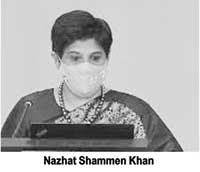 High Commissioner Michelle Bachelet’s address was brief and uncontroversial this time without mentioning any country or region. It is clear by now perhaps she is not the real author of the Report against Sri Lanka, but someone probably hired by the so-called core-group led by Britain. Her major points were related to the coronavirus pandemic trying to highlight some of the socio-economic disparities and imbalances of policy making that have emerged as a result. The neglect of women, minorities, and the marginalized sections of society were emphasized. But the poor was not mentioned. As a former medical doctor, she also opted to highlight some of the medical issues underpinning the crisis.
High Commissioner Michelle Bachelet’s address was brief and uncontroversial this time without mentioning any country or region. It is clear by now perhaps she is not the real author of the Report against Sri Lanka, but someone probably hired by the so-called core-group led by Britain. Her major points were related to the coronavirus pandemic trying to highlight some of the socio-economic disparities and imbalances of policy making that have emerged as a result. The neglect of women, minorities, and the marginalized sections of society were emphasized. But the poor was not mentioned. As a former medical doctor, she also opted to highlight some of the medical issues underpinning the crisis.
Then came the statements from different countries in the first meeting in the following order: Uzbekistan, Colombia, Lithuania, Afghanistan, Poland, Venezuela, Finland, Fiji, Moldova, Georgia, Kazakhstan, Equatorial Guinea, Vietnam, Belgium, and Morocco. The obvious purposes of these statements were different. Some countries were apparently canvassing for getting into the Human Rights Council at the next turn perhaps for the purpose of prestige. Some others were playing regional politics against their perceived enemies. This was very clear when Lithuania and Poland started attacking Russia.
But there were very sincere human rights presentations as well. One was the statement by the President of Afghanistan, Mohammad Ashraf Ghani. He outlined the devastating effects that Afghanistan had to undergo during the last 40 years, because of foreign interferences. The initial support to Taliban by big powers was hinted. His kind appeal was to the UN was to go ‘beyond discourse to practice’ giving equal chance to the poor and the developing countries to involve without discrimination.
Controversial Presentations
China’s Foreign Affairs Minister, Wang Yi, made his presentation almost at the end of the first day. This is apparently the first time that China had directly addressed the Human Rights Council. Beginning with outlining the devastating repercussions of the coronavirus pandemic he stressed that the world should face the challenges through ‘solidarity and cooperation.’ He broadened the concept to human rights solidarity and cooperation. His expressed views were quite different to the others, particularly to the Western ones.
He frankly said that what he expresses are the views of China on human rights without claiming those are absolute truths or forcing others to believe or implement them. There were four main concepts that he put forward before the member countries. First, he said, “We should embrace a human rights philosophy that centres on the people. The people’s interests are where the human rights cause starts and ends.” Second, he said, “we should uphold both universality and particularity of human rights. Peace, development, equity, justice, democracy, and freedom are common values shared by all humanity and recognized by all countries.” “On the other hand,” he said, “countries must promote and protect human rights in light of their national realities and the needs of their people.”
“Third,” he said, “we should systemically advance all aspects of human rights. Human rights are an all-encompassing concept. They include civil and political rights as well as economic, social, and cultural rights.” He then emphasized, “Among them, the rights to subsistence and development are the basic human rights of paramount importance.” Fourth, “we should continue to promote international dialogue and cooperation on human rights. Global human rights governance should be advanced through consultation among all countries.”
It was on the same first day before China, that the United Kingdom launched its barrage against several countries not sparing Sri Lanka. The Foreign Secretary, Dominic Raab, delivered the statement from top to bottom attacking alleged violating countries on human rights. But there was no mentioning of Israel for the repression of Palestinians or the systemic racism rampaging in the United States, including the 6 January attacks on the Capitol by extremist/terrorist groups.
His first sermon was on Myanmar without acknowledging the British atrocities or mismanagement of this poor and diverse country during the colonial period. He was quite jubilant over implementing sanctions and other restrictions over the country. Many sanctions, in my opinion, are extortions. Undoubtedly, Aung San Suu Kyi and other leaders should be released, and democracy restored. This is a task of the whole council and when one or two countries try to grab the credit, there can be obvious reservations of others.
His further scathing attacks were against Belarus, Russia, and China. Some appeared factually correct but not necessarily the approach or the motives genuine. The following is the way he came around Sri Lanka. He said,
“Finally, we will continue to lead action in this Council: on Syria, as we do at each session; on South Sudan; and on Sri Lanka, where we will present a new resolution to maintain the focus on reconciliation and on accountability.”
‘Action’ to him basically means repeatedly passing resolutions, of course imposing economic and other sanctions. He said, “as we do at each session”; like bullying poor or weak countries at each session. Can there be a resolution against Russia or China? I doubt it.
What would be the purpose of presenting a resolution against Sri Lanka? As he said, “to maintain the focus on reconciliation and on accountability.” This will satisfy neither the Tamil militants nor the Sinhalese masses. But it might satisfy the crafty Opposition (proxy of the defeated last government). This is not going to be based on any of the actual measures that Sri Lanka has taken or not taken on reconciliation or accountability. But based on the ‘Authoritarian and Hypocritical Report’ that some anti-Sri Lankans have drafted within the Office of the High Commissioner for Human Rights. This what I have discussed in my last article.
In this context, successful or not, the statement made by the Sri Lanka’s Minister of External Affairs, Dinesh Gunawardena, in rejecting any resolution based on the foxy Report of the Office of the UN High Commissioner for Human Rights, in my concerned opinion, is absolutely correct.
Opinion
President’s energy directives ignored by the Power Ministry: Another Point of View

Dr Tilak Siyambalapitiya
Dr Janaka Rathnasiri laments (The Island 19 Feb 2021) that the Power Ministry has ignored the President’s directive to draw 70% of energy from renewable sources by 2030. I saw the approved costs of electricity production for 2019, published by the Public Utilities Commission (PUCSL).
PUCSL has also approved the prices to sell electricity to customers. Although various customers pay at various “approved” prices, the average income from such “approved” prices in 2019 was Rs 17.02 per unit. It is not only the Ministry, according to Dr Rathnasiri, ignoring the President; PUCSL is also breaking the law, which says prices and approved costs should be equal.
 So there is already an illegal gap of Rs 21.59 minus 17.02 = Rs 4.57 per unit of electricity sold. If electricity prices are not to be increased, as stated by many in the government and PUCSL, let us say the following: Distribution costs should decrease by 0.57 Rs per unit. Generation costs should decrease by Rs 4.00 per unit.
So there is already an illegal gap of Rs 21.59 minus 17.02 = Rs 4.57 per unit of electricity sold. If electricity prices are not to be increased, as stated by many in the government and PUCSL, let us say the following: Distribution costs should decrease by 0.57 Rs per unit. Generation costs should decrease by Rs 4.00 per unit.
PUCSL also published the approved cost of purchasing or producing electricity from various sources for 2019. The actual energy values were different to what was approved, but let us stick to PUCSL approved figures:
I suggest Dr Rathnasiri fills-up the following table, to show how much electricity will cost in 2030 to produce and deliver, if the President’s 70% target is to be achieved and for PUCSL to abide by the law. Let us assume that electricity requirement in 2030 will be double that of 2019.
 Since PUCSL has to save Rs 4 from 13.92, the average selling price for energy should be Rs 13.92 minus 4.00 = Rs 9.92. With a target network loss of 7% (in 2019 it was 8.4%), the average cost of production has to be Rs 9.27 per unit. Eight cages have to be filled-up by Dr Rathnasiri.
Since PUCSL has to save Rs 4 from 13.92, the average selling price for energy should be Rs 13.92 minus 4.00 = Rs 9.92. With a target network loss of 7% (in 2019 it was 8.4%), the average cost of production has to be Rs 9.27 per unit. Eight cages have to be filled-up by Dr Rathnasiri.
In 2012, PUCSL approved the energy cost of electricity produced from coal power to be 6.33 Rs per kWh. In 2019, PUCSL approved 9.89 (56% increase). For renewable energy, it was 13.69 in 2012, and 19.24 in 2019 (a 40% increase, but double the price of electricity from coal fired generation). In 2012, rooftop solar was not paid for: only give and take, but now paid Rs 22, against Rs 9.89 from coal. There seems to be something wrong. The price reductions of renewable energy being promised, being insulated from rupee depreciation, are not happening? Either Sri Lanka must be paying too little for coal, or it may be renewable energy is severely over-priced?
On coal we hear only of some corruption every now and then; so Sri Lanka cannot be paying less than it costs, for coal.
Enough money even to donate
vaccines
 Another reason for the Ministry of Power to ignore the President’s directive may be the Ministry’s previous experience with similar Presidential directives. In 2015, the President at that time cancelled the Sampur coal-fired power plant, and the Ministry faithfully obliged. That President and that Prime Minister then played ball games with more power plants until they were thrown out of power, leaving a two-billion-dollar deficit (still increasing) in the power sector. Not a single power plant of any description was built.
Another reason for the Ministry of Power to ignore the President’s directive may be the Ministry’s previous experience with similar Presidential directives. In 2015, the President at that time cancelled the Sampur coal-fired power plant, and the Ministry faithfully obliged. That President and that Prime Minister then played ball games with more power plants until they were thrown out of power, leaving a two-billion-dollar deficit (still increasing) in the power sector. Not a single power plant of any description was built.
Where is this deficit? You do not have to look far. In the second table, replace 24.43 with 9.89, to reflect what would have happened if Sampur was allowed to be built. The value 12.79 will go down to 8.55, well below the target of Rs 9.27 per unit to produce. Not only would CEB and LECO report profits, but the government too could have asked for an overdraft from CEB to tide over any cash shortfalls in the treasury. All this with no increase in customer prices. Producers of electricity from renewable energy could enjoy the price of 19.24 Rs per unit. And that blooming thing on your rooftop can continue to enjoy Rs 22 per unit. The Minister of Power, whom Dr Rathnasiri wants to replace with an army officer, would have been the happiest.
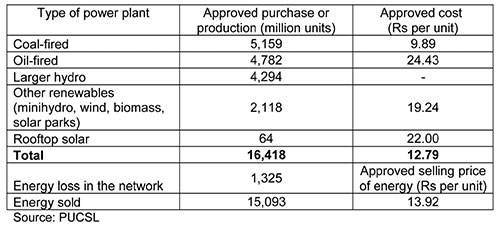 In the absence of Sampur (PUCSL’s letter signed by Chairman Saliya Mathew confirmed cancellation and asked CEB not to build it), PUCSL approved electricity to be produced at Rs 21.59 and sold at Rs 17.02 per unit. The annual loss would be Rs (21.59 – 17.02) x 15,093 = Rs 69 billion per year of approved financial loss. Sri Lanka has a Telecom regulator, an Insurance regulator, a Banking regulator, who never approve prices below costs. Sometime ago the telecom regulator asked the operators to raise the prices, when operators were proposing to reduce prices amidst a price war. But the electricity industry regulator is different: he approves costs amounting to 27% more than the price, not just once but, but continuously for ten long years !
In the absence of Sampur (PUCSL’s letter signed by Chairman Saliya Mathew confirmed cancellation and asked CEB not to build it), PUCSL approved electricity to be produced at Rs 21.59 and sold at Rs 17.02 per unit. The annual loss would be Rs (21.59 – 17.02) x 15,093 = Rs 69 billion per year of approved financial loss. Sri Lanka has a Telecom regulator, an Insurance regulator, a Banking regulator, who never approve prices below costs. Sometime ago the telecom regulator asked the operators to raise the prices, when operators were proposing to reduce prices amidst a price war. But the electricity industry regulator is different: he approves costs amounting to 27% more than the price, not just once but, but continuously for ten long years !
That is 370 million dollars per year as of 2019, the economy is spending, and for years to come, to burn oil (and say we have saved the environment). Did the Minister of Health say we are short of 160 million dollars to buy 40 million doses of the vaccine? Well, being a former Minister of Power, she now knows which Presidential “order” of 2015 is bleeding the economy of 370 million dollars per year, adequate to buy all vaccines and donate an equal amount to a needy country.
Prices are the production costs approved by PUCSL for 2019. The selling price approved by the same PUCSL was Rs 9.27 per unit.
Opinion
Confusion on NGOs and NSOs in Sri Lanka
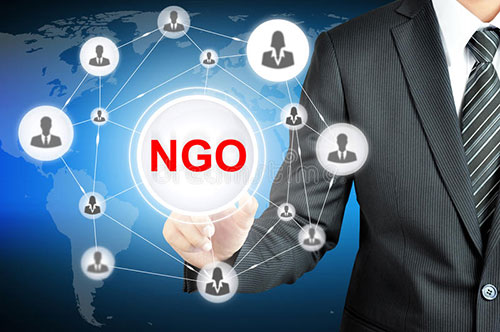
If you listen to politicians and journalists here, you will hear of that curious creature rajya novana sanvidane, a Non-State Organization (NSO). Where do you get them? In the uninstructed and dead minds of those who use those terms. In the real world, where politicians and journalists have developed minds, there are Non-Governmental Organizations (NGO). The United Nations is an organization set up by state parties, not by governments. It is true that agents of states, governments, make the United Nations work or fail. Governments may change but not the states, except rarely. When Eritrea broke away from Ethiopia, a new state was formed and was so recognised by the United Nations. However, the LTTE that tried to set up another state was crushed by the established state that it tried to break away from, and the UN had nothing to do with them.
This entirely unnecessary confusion, created out of ignorance, is so destructive that organizations completely loyal to the existing state, are made to be traitorous outfits, for they are ‘non-state organizations’ within the state. There are citizens of each state, but no citizens of any government. Government is but an instrument of the state. In most states there are organizations, neither of the state nor of government: religious organizations including churches. But none of them is beyond the pale of the state.
Those that speak of rajya novana sanvidane give that name partly because they have no idea of the origin of non-governmental organizations. NGOs came into the limelight, as donor agencies, noticed that some governments, in East Africa, in particular, did not have the capacity and the integrity to use the resources that they provided. They construed, about 1970, that NGOs would be a solution to the problem. Little did they realize that some NGOs themselves would become dens of thieves and brigands. I have not seen any evaluation of the performance of NGOs in any country. There was an incomplete essay written by Dr. Susantha Gunatilleka. NGOs are alternatives to the government, not to the state.
Our Constitution emphatically draws a distinction between the government and state, and lays down that the President is both Head of Government and Head of State (Read Article 2 and Article 30 of the Constitution.) It is as head of state that, he/she is the Commander of the Armed Forces, appoints and receives ambassadors and addresses Parliament annually, when a prorogued Parliament, reconvenes. He/she presides over the Cabinet as head of government. The distinction is most clear, in practice, in Britain where Queen Elizabeth is the head of state and Boris Johnson is the Prime Minister and head of government. However, in principle, Johnson is the Queen’s First Minister appointed by the sovereign, and resigns by advising her of his decision to do so.
In the US and in India the term ‘state’ has special significance. In India there is a ‘rajya sabha’ (the Council of States) whose members represent constituent States and Union Territories. Pretty much the same is true of the United States. In the US, executive power is vested in the President and heads the administration, government in our parlance. The Head of State does not come into the Constitution but those functions that one associates with a head of state are in the US performed by the President of the Republic. The US President does not speak of my state (mage rajaya) but of my administration, (mage anduva). Annually, he addresses Congress on the State of the Union. Our present President must be entirely familiar with all this, having lived there as a citizen of the US for over a decade. It is baffling when someone speaks of a past state as a traitor to that same state. It is probable that a government was a traitor to the state. ‘Treason against the United States, shall consist only in levying war against them, or in adhering to their (States’) enemies, giving them aid and comfort’. That a state was a traitor to the same state is gobbledygook.
Apart from probable confusion that we spoke of in the previous paragraph, it is probable that a president and other members of a government, including members of the governing party here, find it grandiloquent to speak of his/her/their state (mage/ape rajaya), rather than my government (mage anduva) or Sirisena anduva’ and not Sirisena state; it was common to talk of ‘ape anduva’ in 1956; politicians in 1956 were far more literate then than they are now.
When translating from another language, make sure that you understand a bit of the history of the concept that you translate. A public school in the US is not the same as a public school in the UK.
MAHADENAMUTTA









